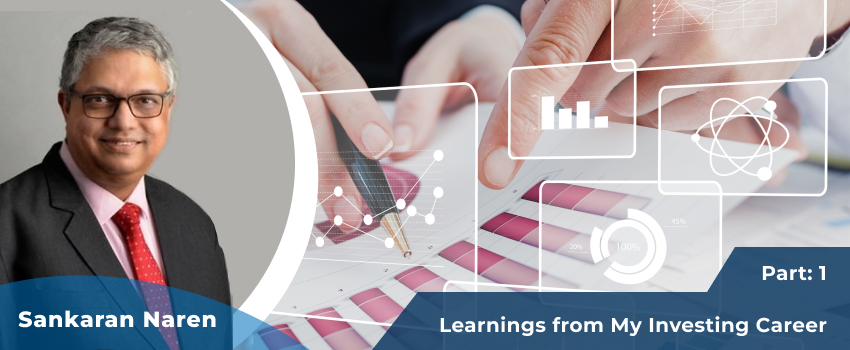Sankaran Naren is a highly respected figure in the Indian investment community, known for his expertise in value investing and his contrarian approach to the markets. He is the Executive Director and Chief Investment Officer (CIO) of ICICI Prudential Asset Management Company, one of India's leading asset management firms, managing more than Rs 7 lakh crores as of March 2024. With over three decades of experience in the financial markets, Naren is recognized for his deep understanding of macroeconomic trends, equity research, and portfolio management.
Naren is renowned for his contrarian approach to investing and his focus on deep-value stocks, steering clear of stocks that are in vogue. Throughout his career, he has built a reputation for identifying overlooked sectors and stocks well before they gain popularity. He emphasizes the importance of combining both top-down and bottom-up analysis to uncover undervalued opportunities that others might miss.
Naren is unwavering in his investment beliefs, often drawing inspiration from the principles of James Montier, a respected figure in value investing. He strongly advocates that being a successful investor requires a contrarian mindset — one that involves seeking value where others do not.
Naren also believes that value opportunities exist in every market environment, but finding these opportunities demands a perspective different from the consensus. He acknowledges that the rewards of this style of investing can take time to materialize, which can be challenging and even isolating. However, he remains committed to his approach, often taking positions in stocks or sectors that others have largely abandoned.
This article is divided into two parts: Part One focuses on core principles and approaches to investing, while Part Two focuses on frameworks, cycles, and behavioural insights. Let’s dive into Part One.
The Three Steps in Investing
Investing is about three things: buying, sizing, and selling. Most investing literature, not only in India but worldwide, focuses on buying. However, sizing portfolios is extremely important. Most investors make mistakes in sizing positions in a manner that is proportional to their conviction, the level of detailed research, and the potential upside. Similarly, investment literature has focused very little on selling. Selling should be thought of as switching in order to factor in the opportunity cost. Often, an investor worries whether a better price will be available in the near future at which one can sell. However, when an investor thinks about switching, the cost of foregoing a more lucrative long-term investment is considered, and the investor does not need to worry if the investment sold increases in value. Naren contends that if an investor focuses more on sizing and selling (or switching) rather than just buying, they could improve their returns.
Contrarian Approach to Investing
Capital flows for fund managers often come at the most inopportune times. Funds typically receive the most money when the market cycle is at its strongest, as investor sentiment is at its highest. However, at such elevated valuations, a fund manager would have difficulty finding suitable investments. Stopping inflows is an unreasonable proposition, and therefore being contrarian is an antidote to the problem.
Contrarian investing does not mean being contrarian for the sake of it, but rather involves deep thinking and exploring sectors abandoned by other investors to find opportunities. One does not need to compromise on quality to be contrarian, but rather to identify value where others are unwilling to look.
To be contrarian effectively, one must be cautious with leveraged stocks, which can cause severe underperformance. Naren finds his opportunities in cyclical stocks, as the cycles help investors decide when to buy and sell. Additionally, a contrarian investor must understand the other side of the trade — the reason why the other side is selling. It is important to have a fair understanding of the counterparty's beliefs. Furthermore, a contrarian investor must have a strong assessment of a company's intrinsic value and manage risk effectively. There is a higher level of risk in differing from the consensus opinion, so successful contrarian investors must manage risk to protect themselves.
Core Beliefs
Cycles: Everything operates in cycles, swinging from one end of pessimism to the other end of euphoria. The most important ability an investor can possess is the ability to look at markets in cycles. However, cycles cannot be determined through arithmetic means, and it is impossible to call market peaks and bottoms, but reasonable judgment is often sufficient.
Charts: One must look at charts before buying and selling to understand how many other investors share the same view. Fundamental investors often dismiss the idea of looking at charts, deeming it the territory of technical analysts. Naren does not advocate using charts for technical analysis but rather to understand the extent of consensus.
Common Sense: Common sense is easy in retrospect but must be applied to the present situation. Given market conditions, one must use common sense to make decisions regarding allocations and returning money to clients if necessary. Common sense often requires acting in a way that the consensus may not, which makes common sense investing quite uncommon.
Holding Cash: Cash is often considered a residual asset class, but it is an important one. The ability to hold cash is extremely important as it allows one to buy during times of extreme pessimism when asset prices are at their lowest.
Stock Picking
Every investor has a style of stock picking that may be out of favor in certain market conditions. Naren focuses on factors such as dividend yield, trailing price-to-earnings, trailing price-to-book, and market capitalization, among others. In certain market conditions, using trailing multiples has not been rewarding, as companies trading at high multiples compared to the past may continue to benefit from further multiple expansion. However, over the long term, Naren believes that these metrics work extremely well to find opportunities.
In his opinion, market capitalization can serve as a good metric to signal overvaluation or undervaluation in market extremes. For example, in December 1999, the combined market capitalization of Infosys and Wipro at Rs. 1,07,604 crores was more than three times the market capitalizations of the cement and metal sectors combined at Rs. 31,623 crores. While one may be wrong in the timing of selling, as there may be further euphoria left in the overvalued sector, one would largely be correct in buying. Similarly, in December 2007, DLF’s market capitalization of Rs. 1,83,082 crores was greater than the entire pharmaceutical sector's market capitalization of Rs. 1,31,249 crores. Interestingly, in 2015, two pharmaceutical companies, Sun Pharma and Lupin, had a combined market capitalization of Rs. 2,95,302 crores, while the entire metal sector had a valuation of Rs. 2,86,600 crores. Most recently, in September 2019, Hindustan Unilever’s market capitalization of Rs. 4,29,055 crores was greater than the combined market capitalization of the top 10 pharmaceutical companies, which stood at Rs. 3,95,178 crores.
In all these cases, the overvalued sector has subsequently underperformed, while the undervalued sector has outperformed significantly. The analysis by market capitalization is a thinking tool to understand market absurdity. This method is not infallible and may fail when considering disruptive industries where growth is expected to continue for extended periods.
To continue exploring this topic and dive deeper into our insights, don’t miss out on Part 2 of our blog series which discusses frameworks, cycles, and behavioural insights. Click here to access it now!
Already have an account? Log in
Want complete access
to this story?
Register Now For Free!
Also get more expert insights, QVPT ratings of 3500+ stocks, Stocks
Screener and much more on Registering.
































Comment Your Thoughts: